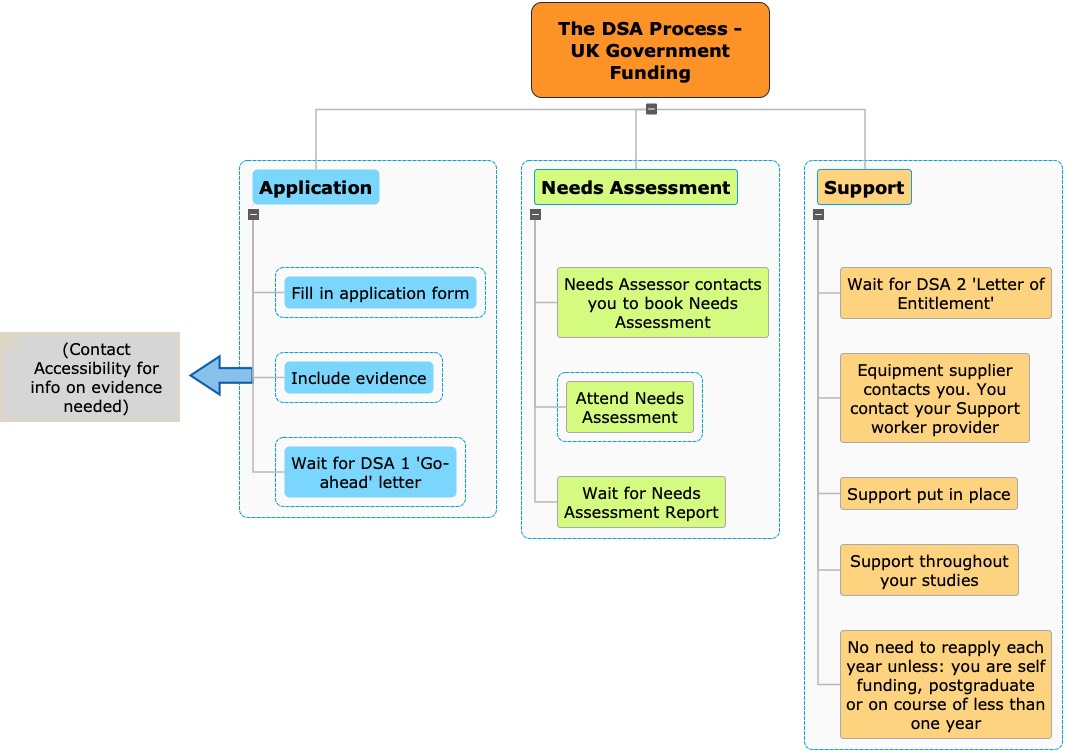Flowchart of the application process
(Our Accessibility team are here to advise and support you throughout this process.)

Watch a video of the steps being explained.
Application
Overview
See the 'Save the Student' website, which has a clear DSA Guide.
DSA websites for each UK country
Below are the different DSA pages for each UK country. Click the link for your home country to read detailed guidance on how to apply and find the forms you need to fill in.
- England – Student Finance England
- Scotland – Student Awards Agency Scotland
- Wales – Student Finance Wales
- Northern Ireland – Student Finance NI.
Evidence
When applying, you have to provide evidence of your condition. For disabilities, mental health conditions, Autistic Spectrum or long-term health conditions you will need a copy of a report or letter from your GP or consultant (or completed disability evidence form).
SpLD evidence - please read carefully
For Specific Learning Differences such as dyslexia or dyspraxia, you will need a diagnostic assessment from a suitably-qualified educational psychologist or specialist teacher assessor with an Assessment Practising Certificate (APC). You can check these on the SASC website. A school statement or evidence of exam arrangements is not sufficient.
You can expect to pay at least £375 for a diagnostic assessment, so you might want to do some screening first to check if it is worthwhile.
- If you are a Falmouth undergraduate studying on campus, please see the page on 'Screening and Assessment for Specific Learning Differences'.
- All other students please see the page on 'Information, checklists and screening for SpLDs and Autism'.
If you have any questions about possible SpLDs and screening, please contact our Inclusive Learning team.
Hardship Fund (for Exeter students)
You may be able to get help towards the cost of your assessment if you are on a low income. See the link below:
DSA 1 letter
If your application for DSA is successful, you will get a letter (known as a DSA 1) from your funding body explaining that you need to have a Study Needs Assessment. (You will not need to pay for this.) Please read the letter carefully for full information about your next steps.
Needs Assessment
Study Needs Assessments can be carried out face-to-face or online. They usually last between one and two hours and involve a discussion between you and a Study Needs Assessor, who will ask you how you study and what areas you you may struggle with. You will then usually look at different types of support software and equipment and discuss one-to-one support. Have a think beforehand about what kind of support might be useful, what areas you want more information about and any concerns you might have.
By the end of the Study Needs Assessment, you and your assessor will have agreed on what support is going to be recommended. The assessor will then write a report with details of your support and send a copy to you, your funding body and (with your permission) your university. Once your funding body has received this report, they will send you another letter (known as a DSA 2) to confirm which recommendations they agree to fund.
This letter will tell you what to do and who to contact. Usually, the provider of your equipment and software will contact you to arrange delivery, set-up and training. However, you will need to contact the provider(s) of any non-medical support (for example, study skills tutors and mentors) to arrange this.
Support
If you have been awarded a laptop or computer, you will have to pay the £200 contribution to the equipment supplier before they can deliver it.
Ideally, try to get your support set up before you start university as this will make everything go more smoothly. However, you can apply for DSA at any time during your course.
If you are getting a specialist tutor, mentor or other non-medical helper (NMH), contact the support provider to say you would like the support to start. Try to meet with your NMH regularly, as this will help you put long-term strategies in place which will help you meet your full potential on your course.